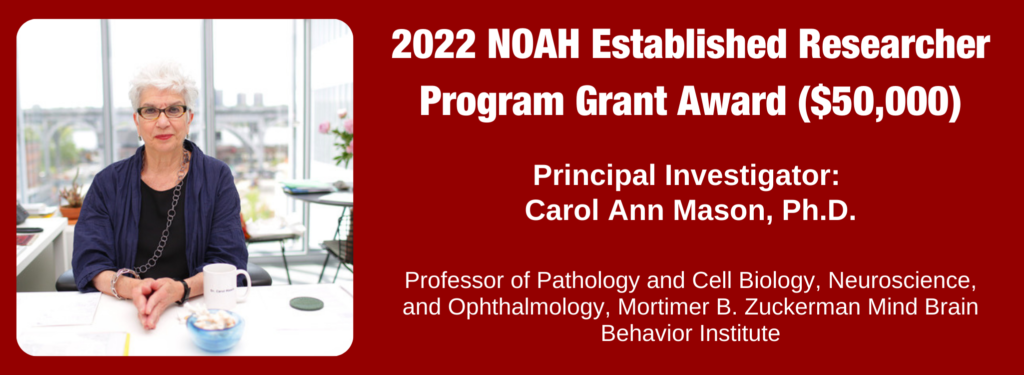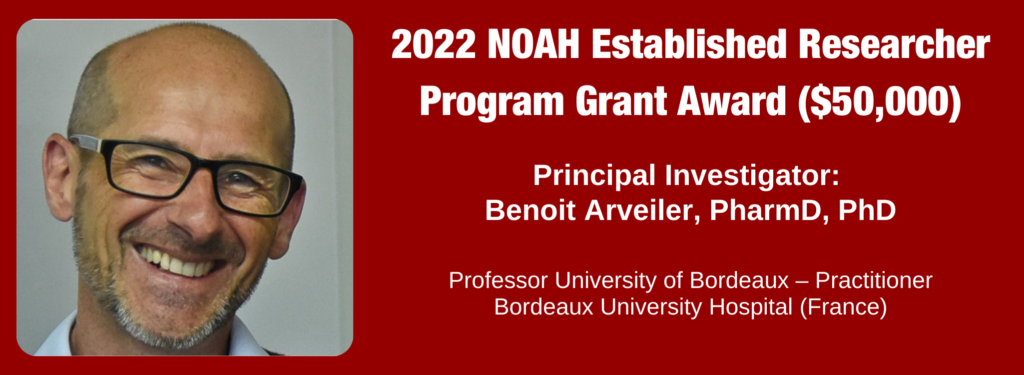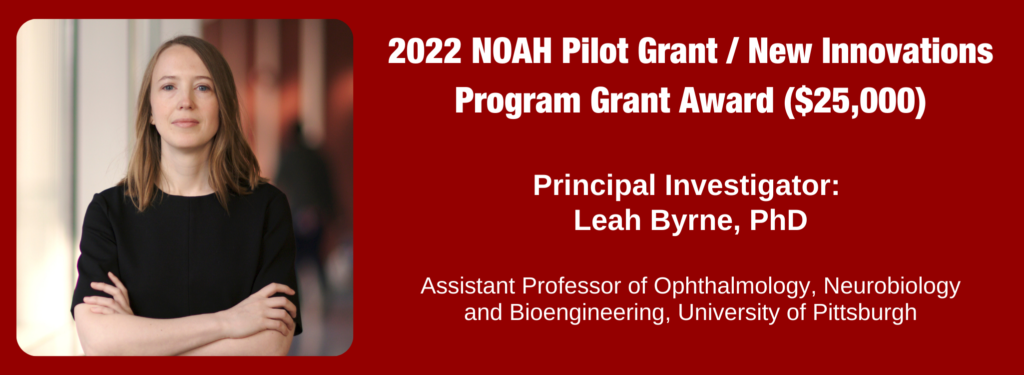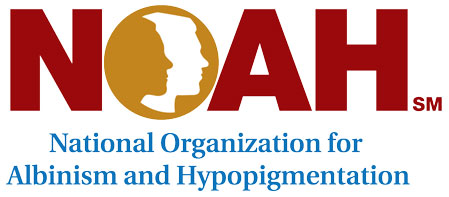March 15, 2022
Email Contact: info@albinism.org
Phone: 800 473-2310
www.albinism.org
National Organization for Albinism and Hypopigmentation (NOAH) Awards Inaugural Grants to Fund Albinism Research
East Hampstead, NH – March 15, 2022 – The National Organization for Albinism and Hypopigmentation (NOAH) is pleased to announce the award of research grants totaling $125,000, presented to three institutions conducting albinism research. This funding is provided through the NOAH Research Program, established in 2021, to support and fund patient-centered research that leads to developing a greater understanding of albinism.
NOAH’s Research Program accepted grant applications for two funding categories – Established Researcher Program Grant and Pilot/New Innovations Program Grant. The Established Researcher Program Grant was intended to provide bridge funding for or support the expansion of existing projects from established researchers. The Pilot/New Innovations Program Grant was intended to provide funding to generate pilot data for new projects led by junior or established researchers
The following recipients received inaugural funds from NOAH’s Research Program.
Columbia University, with Dr. Carol Mason as Principal Investigator, will receive the 2022 NOAH Established Researcher Program Grant worth $50,000. Dr. Mason, with her lab team Columbia University, with Dr. Carol Mason as Principal Investigator, will receive the 2022 NOAH Established Researcher Program Grant worth $50,000. Dr. Mason, with her lab team and collaborators, proposed the project Cell and molecular defects in the developing albino eye lead to an impaired binocular circuit: What does the RPE do? Their work aims to reveal the causes of altered connections between the albino retina and the brain, which ultimately lead to poor stereo vision.
Also receiving the 2022 NOAH Established Researcher Program Grant Award for $50,000 is the University of Bordeaux with Pr. Benoit Arveiler as Principal Investigator. Pr. Arveiler, with his lab team and collaborators, proposed the project Linking melanogenesis to retinal development by comparing OCA8 to OCA1 models. This project aims to explore different cellular and developmental models of OCA8 compared to the most common type (OCA1) in order to better understand the genesis of ocular pathology at the molecular level.
University of Pittsburgh, with Dr. Leah Byrne as Principal Investigator, has secured the 2022 NOAH Pilot/New Innovations Program Grant Award worth $25,000. Dr. Byrne, with her lab team and collaborators, proposed the project New approaches for AAV-mediated gene therapy to treat albinism. The Byrne Lab will leverage their state-of-the-art viral vector pipeline to develop new gene therapies for OCA1 and investigate the molecular mechanisms underlying retinal disease in OCA1 patients. They aim to lay the foundation for new treatments that will ameliorate visual impairment in patients with OCA1.
NOAH is committed to becoming a leading voice in albinism research through the work of its Research Program and is thrilled to support the projects of Dr. Mason, Pr. Arveiler, and Dr. Byrne with the award of its inaugural research grant funds. “NOAH has served the albinism community for nearly forty years. It is exciting to see our organization establish a funding source dedicated to albinism research,” says Karen Bly, NOAH Executive Director. “These projects have the potential to improve the lives of those with albinism.”
NOAH’s Research Program anticipates annual funding opportunities. Research priorities, eligibility requirements, and application deadlines will be posted on the NOAH website at www.albinism.org/research/.
About the National Organization for Albinism and Hypopigmentation
Since 1982, National Organization for Albinism and Hypopigmentation (NOAH) has focused on providing information and support to the albinism community. Recognizing the inherent value that comes when people who share a rare genetic condition gather, NOAH acts as a conduit of information about all aspects of living with albinism and provides a place where people with albinism and their families can find acceptance, support and fellowship. NOAH’s development, steady growth and accomplishments have been fueled by the dedication of many volunteers who have shared their time, talent and treasure in service to the albinism community.
For more information about albinism and NOAH – www.albinism.org or info@albinism.org.
###
2022 NOAH Research Program Grant Awardees

2022 NOAH Established Researcher Program Grant Award ($50,000)
Institution:
Columbia University (New York, USA)
Principal Investigator:
Carol Ann Mason, Ph.D.
Professor of Pathology and Cell Biology, Neuroscience, and Ophthalmology, Mortimer B. Zuckerman Mind Brain Behavior Institute
Collaborator:
Dr. Nefeli Slavi, Ph.D.
Columbia University
Postdoctoral Research Scientist
Research Project Summary:
Our work aims to reveal the causes of altered connections between the albino retina and the brain, which ultimately lead to poor stereo vision. We are exploring the hypothesis that certain inflammatory signals are transferred from the hypopigmented RPE to the retina, where they interfere with cell division and production of neurons. As a result, some retinal neurons are born with delays and lack the properties to project correctly to the brain.

2022 NOAH Established Researcher Program Grant Award ($50,000)
Institution:
University of Bordeaux (Bordeaux, France)
Principal Investigator:
Benoit Arveiler, PharmD, PhD
Professor University of Bordeaux – Practitioner Bordeaux University Hospital (France)
Key Personnel:
JAVERZAT Sophie, Pr. , PhD
MRGM INSERM U1211 Bordeaux, France
Co-head of project
MICHAUD Vincent, M.D.
MRGM INSERM U1211 Bordeaux, France
PhD student
TINGAUD-SEQUEIRA Angèle, PhD
MRGM INSERM U1211 Bordeaux, France
Engineer
KALATZIS Vasiliki, Dr., PhD
INM INSERM U1298 Montpellier, France
Key collaborator
Research Project Summary:
Not all patients with albinism have the same clinical profile due to genetic heterogeneity. We have recently identified a new gene for oculocutaneous albinism (OCA8) in patients with intriguing characteristics. The project aims to explore different cellular and developmental models of OCA8 compared to the major type (OCA1) in order to better understand the genesis of ocular pathology at the molecular level. This work should guide therapeutic strategies to prevent retinal defects in all patients with albinism.

2022 NOAH Pilot Grant / New Innovations Program Grant Award ($25,000)
Institution:
University of Pittsburgh (Pennsylvania, USA)
Principal Investigator:
Leah Byrne, PhD
Assistant Professor of Ophthalmology, Neurobiology and Bioengineering, University of Pittsburgh
Collaborators:
Alessandra Larimer-Picciani, BA
University of Pittsburgh, Department of Ophthalmology
Role on project: Medical student researcher
Wyatt Kriebel (undergrad)
University of Pittsburgh, Department of Ophthalmology
Role on project: Student researcher
Research Project Summary:
Oculocutaneous albinism type 1 (OCA1) results from mutations in the tyrosinase (TYR) gene. Currently, there are no treatment options to reverse the effects of albinism, making OCA1 therapies a significant unmet clinical need. The Byrne Lab will leverage our state-of-the art viral vector pipeline to develop new gene therapies for OCA1 and investigate the molecular mechanisms underlying retinal disease in OCA1 patients. We aim to lay the foundati
